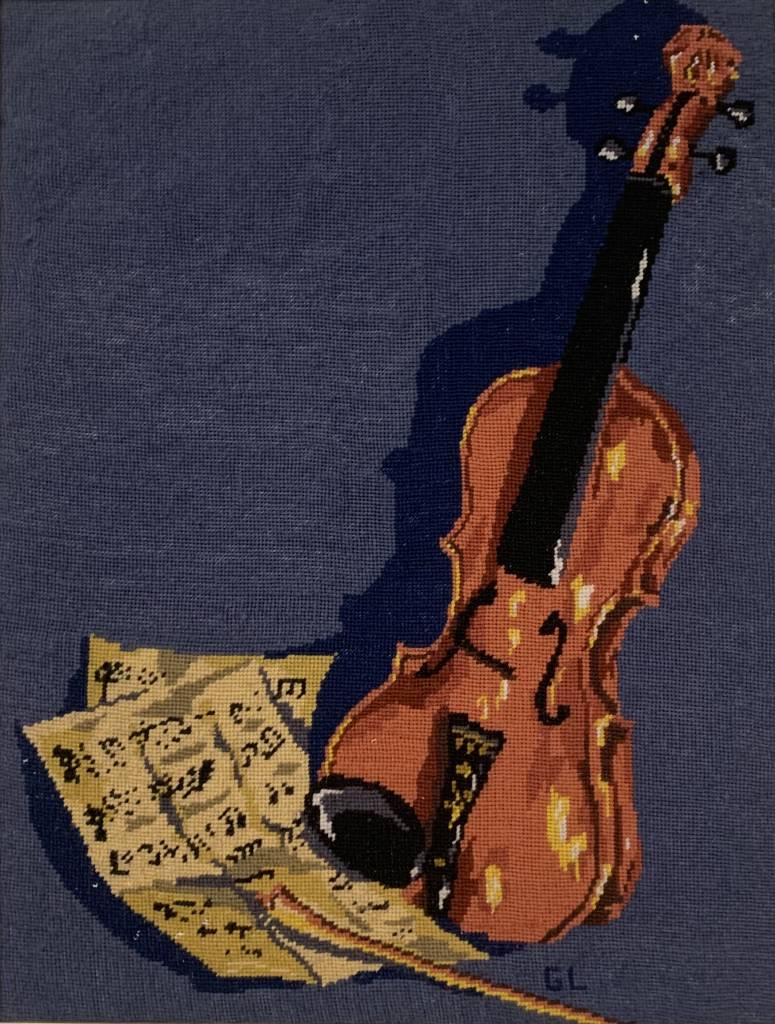
“Violin” needlepoint by Gwen Lewis, photo by K. Rummer
Music that can touch the soul
César Franck’s “Panis Angelicus”
by Ken Rummer
I’m working up a violin piece for church. With our choir still on pandemic hold, the call went out for special music and I raised my hand.
Have you ever heard music that seemed familiar, even though you were hearing it for the first time? Music that moved you to the edge of tears? Music that set off sympathetic vibrations in the deep places of your heart?
The piece I’m practicing, “Panis Angelicus,” is that kind of music for me. The title is in Latin, and that may be a bit off-putting, but it just means bread of angels.
César Franck—his last name rhymes with honk—wrote the piece in 1872. He was living in Paris at the time, supporting his composing dream by working as a church organist and music teacher.
For the words, he chose a verse of a Latin hymn written by Thomas Aquinas in the 1200s. Old words paired with new notes—it’s a recurring theme in church music.
The text Franck chose from Aquinas’s hymn conveys wonder, that the bread of angels is made the bread for people, and that, in the sacrament of Holy Communion, even the poor get to feed upon their Lord. The opening words, panis angelicus, have come to serve as a title for Franck’s composition.
I first fell in love with this music through the anthem “O Lord Most Holy” when I sang it as a teenager in our church choir. Words in English were printed below the notes, and then the Latin words below them. I remember being puzzled as a first-year Latin student, trying to make sense of O Lord most holy as a translation of Panis angelicus.
It turns out the English words are not a translation at all, but a new text joined to Franck’s music, one apparently authored by Arthur H. Ryder who is listed as editor on the sheet music. Old notes paired with new words—it’s another recurring theme in church music.
In the 1904 edition, Ryder’s new words offer a deeply felt prayer. Singing with the help of the “Panis Angelicus” melodies, the prayer acknowledges willful hearts and wandering thoughts and asks for God’s help and favor. I found it moving, and still do.
Of course, in the arrangement for violin and piano I am playing, neither Ryder’s words nor Aquinas’s will appear. I’ll have the bread of angels and the holy Lord in mind when I play, but it will be Franck’s music itself that reaches out to the gathered congregation and to God.
As I hear the music, the mood is prayerful, but it is a prayer that includes both shouts and whispers. The notes suggest the struggle, but point to wonders, too. The tune invites us on a journey that brings us, by the end, to the answer that is beyond our questions, and to the presence that is more than home.
Looking for music that can touch the soul? I recommend “Panis Angelicus.” But I’m also curious about music you have found. What soul-touching piece would you suggest? Just drop the title into the comments and add to our list of musical treasures.

Ken Rummer, Teaching Elder PCUSA, Honorably Retired
Ken Rummer writes about life and faith from the middle of Iowa by the High Trestle Trail. Additional posts are available at https://www.presbyterianmission.org/today/author/krummer/